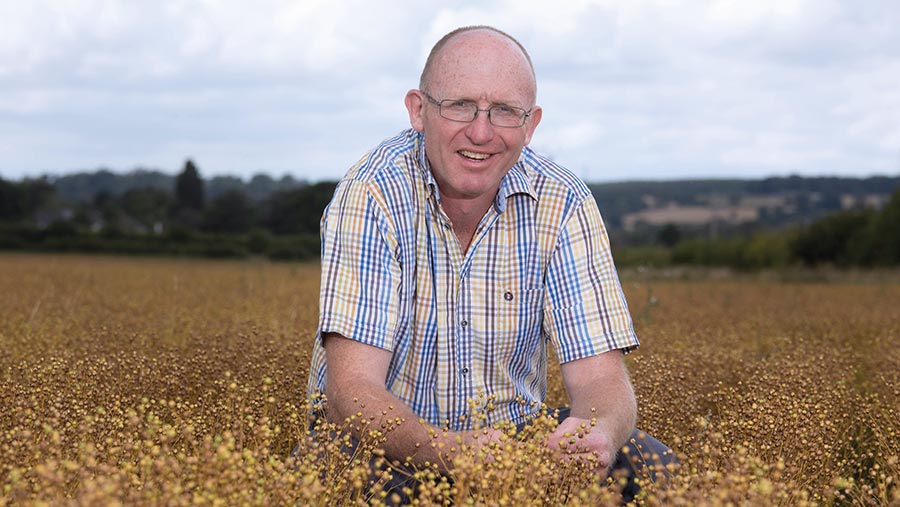Why agronomists need new skills and services
 © Tim Scrivener
© Tim Scrivener The fresh approach that new agricultural policy demands of the farming industry will see agronomists become system-focused rather than product-focused, says Farmers Weekly Arable Adviser of the Year Mark Dewes.
With the emphasis shifting to sustainability, there will be a need to develop more resilience in farming systems, making longer-lived solutions rather than “quick fixes” a key part of the agronomy offering, he predicts.
That may mean upskilling agronomists to provide new services, which in turn could lead to the emergence of a different business model to those that most agronomists operate now.
“The direction of travel is clear,” he says. “The speed at which people are moving may differ, but it’s clear that farming’s reliance on synthetic inputs is reducing.
“As pesticide programmes become simpler and less effective, the requirement for expertise in navigating their complexity reduces. Agronomists will have to develop other skills or face a shrinking of their role.”
See also: Why more growers are turning to independent agronomists
New skills
Some agronomists will see their job description expanding as they develop innovative farm practices that protect and enhance natural capital, as well as farm profits, he notes.
“Where the whole farm system is essential to the future success of the business, factors such as water management, nutrient use efficiency, soil health, biodiversity and rotation planning will take centre stage and feed through into profitability.
“Agronomists will still help farmers to solve problems, but the solutions they have to offer are less likely to come from products.”
This shift means that specific skills need to be developed and a re-positioning will be required. “The emphasis put on chemistry in recent years is changing,” he says. “Now that it is past its peak of effectiveness, agronomists risk becoming irrelevant without a wider skill set.”
Marginal land
He identifies one of those skills as managing marginal land. “Highly productive land is a much easier proposition. It can continue to be cropped in such a way that is beneficial to the environment, while proving profitable for the farmer.
“More land is becoming marginal for arable production through climate change and its effect on weather patterns – creating difficulties with water management and growing crops such as oilseed rape.”
As the Basic Payment Scheme (BPS) goes and ELM becomes a reality, farmers will be taking more land out of production. Using BPS to subsidise arable activities will no longer be an option – all of which will combine to reduce the arable area previously walked by traditional agronomists.
Where the right approach is not to crop the land, they may have a role in helping to manage its use. “Enhancing the natural capital, incorporating species diversity with or without livestock are possible alternatives for this increasing area.”
Business model
This changing landscape may need adjustments to the business models of both independent and company agronomists, and Mr Dewes’ experience with both sectors makes him question how these will develop.
“Will charging an acreage-based retainer fee still be the most appropriate model for this diverse and evolving role, where product supply and advice are separate? Or will an hourly fee for the specialism that the farm business requires be a better solution?”
Either way, agronomists will help farmers develop better, more integrated systems – which may involve very few products, so new services and income streams will emerge, he predicts.
A good example is regenerative agriculture, which is attracting interest and support as growers looking to reduce their reliance on synthetic inputs.
“It’s a very convincing approach but we have discovered very quickly that attempting rapid changes needs careful management if the pitfalls are to be avoided.”
Looking ahead
Challenges that are likely to intensify for agronomists include climate change and soil degradation, he believes. “Both are increasing the fragility of current production systems and hitting the bottom line.
“We’ve seen the establishment difficulties that growers have had to deal with over the past two years and the effect this has had on profitability.”
Genetics will have a big role to play and can help to improve resilience, he says. “There was some complacency while we still had a full chemical toolbox, but that’s changed and the plant breeding companies are coming up with some better solutions.”
Gene editing is a more complicated issue. “There is still a myriad of trade, politics and public perception issues to overcome before we could consider its use.”
Mr Dewes says the agronomist’s role is more interesting now than at any time in the past 10 years.
“We have to renew our skills and the way that we work with farmers. This should stimulate innovation and, once that’s been refined through competition, we will be in the position to help our customers adapt.”
Enter the 2021 Farmers Weekly Awards
Join Farmers Weekly in celebrating the farming industry and recognising the hard work of UK farmers and enter the awards today.
Alternatively, nominate a deserving individual for an award.
For more information about the 2021 Farmers Weekly Awards, visit the official website.

